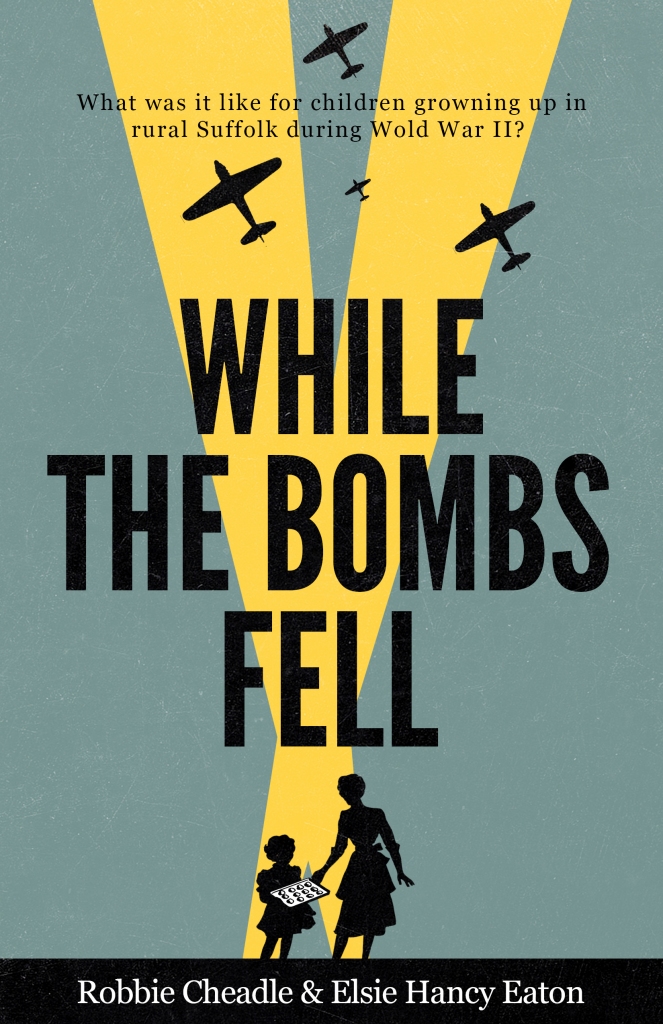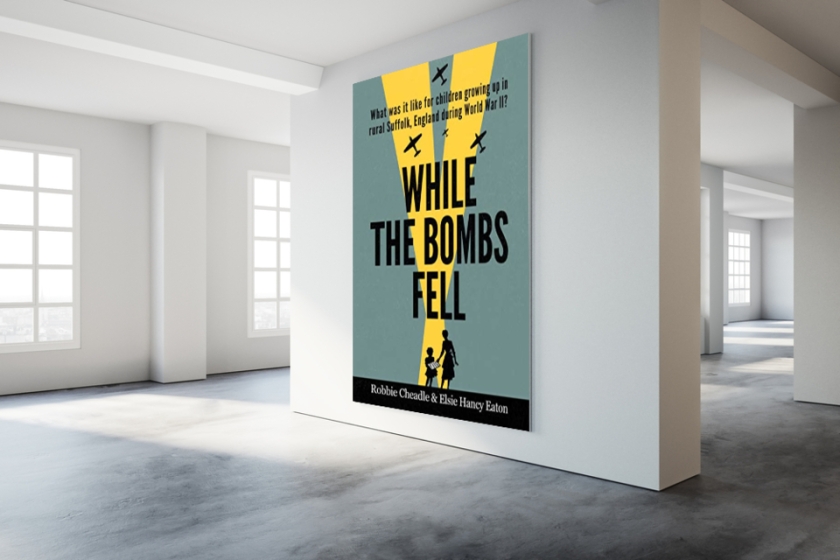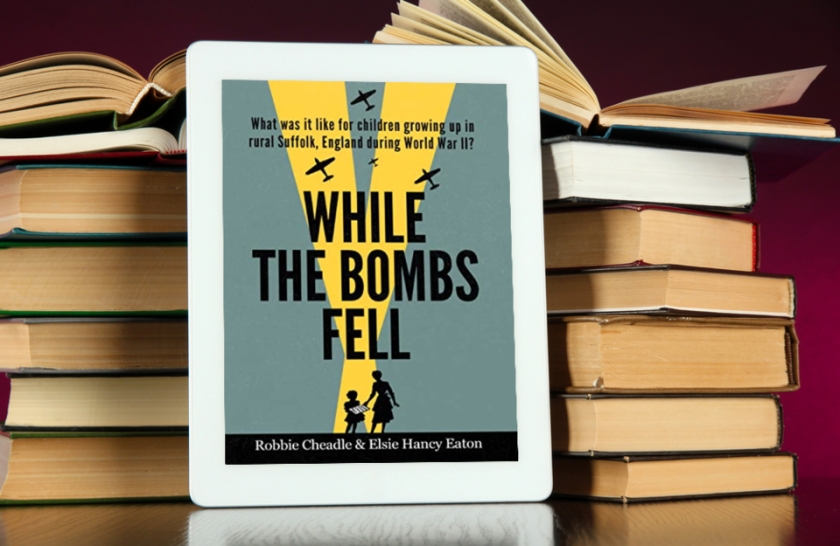It’s my pleasure to host colleague and fellow member of Rave Reviews Book Club, Robbie Cheadle, to our Fiora Books site today. Please support this gifted author.
The benefits of living on a farm during the war
While the bombs fell is a collaboration between my mother, Elsie Hancy Eaton, and me and tells a fictionalized account of her life as a small girl growing up in the small English town of Bungay, Suffolk during World War II.
Life for the children of a farmer in England during the war brought a lot of benefits compared to city and other children.
The greatest good fortune for my mother and her family was that, as a farmer, their father was exempt from fighting in the war. Farmers, like firefighters, medical practitioners and policemen, were considered to provide an essential service to the nation. All the other men in the town, between the ages of eighteen and forty-one years old, were obliged to enlist in the army and their families were left to fend for themselves while they were away.
Another advantage of living on a dairy farm was that the family suffered no shortage of milk. As an agricultural worker doing a heavy manual job, my grandfather also received extra cheese rations, although other luxuries like butter were in short supply.
The children were also able to supplement their diet with other food sources such as the occasional egg from a swan and eels from the river as per the following extract:
“After tea, Wendy set a fishing line which she left overnight. She was excellent at this and frequently caught an eel or two. She dug for worms in the kitchen garden to bait the line.
The green-brown eels looked like snakes, but they tasted delicious, cooked in milk and water in a frying pan and flavoured with pepper.
Elsie hoped that Wendy would catch some eels for them to eat. In the morning, Wendy would run down to the river to see what she had caught.”
Their father was also able to supplement their table with game, especially rabbits, which often came onto his land. My grandmother would make a rabbit stew to feed her large family of two adults and six children and a baby.
The following extract explains how my grandmother made her rabbit stews:
“She cut the rabbit into joints using her knife and put it to soak in a bowl of cold water with one
tablespoon of vinegar. After thirty minutes she removed the pieces from the water and dried them well with a cloth.
Mother mixed a small amount of flour with salt and pepper and coated every piece of the rabbit with the mixture. In a large pot on the paraffin heater, she heated a small amount of lard, a white animal fat, and the rinds of two rashers of bacon, when available. She then added the coated rabbit joints and cooked them for about ten minutes until they were golden brown. The meat in the pot sizzled and fried, and it smelled good.
Mother removed the rabbit from the pot and added two rashers of chopped bacon, if she could get it, as well as two medium onions, cut into slices, and three medium carrots, chopped into pieces. After she sautéed the vegetables and bacon for approximately five minutes, she returned the rabbit to the pot. She added water and one grated apple. Wendy would help Mother stir the liquid as it came to the boil and thickened slightly. Finally, Mother added gravy salts and whole peeled potatoes and allowed the stew in the pot to simmer for about three hours until lunchtime. The family heartily appreciated rabbit stew as a mid-day meal.”
From both a family and food, perspective, my mother and her siblings were a lot more fortunate than many other children, a lot of whom were evacuated from London during the blitz and had to live with strangers, not all of whom treated them well.

BOOK BLURB:
What was it like for children growing up in rural Suffolk during World War 2?
Elsie and her family live in a small double-storey cottage in Bungay, Suffolk. Every night she lies awake listening anxiously for the sound of the German bomber planes. Often they come and the air raid siren sounds signalling that the family must leave their beds and venture out to the air-raid shelter in the garden.
Despite the war raging across the English channel, daily life continues with its highlights, such as Christmas and the traditional Boxing Day fox hunt, and its wary moments when Elsie learns the stories of Jack Frost and the ghostly and terrifying Black Shuck that haunts the coastline and countryside of East Anglia.
Includes some authentic World War 2 recipes.

AUTHOR BIO:
Hello, my name is Robbie, short for Roberta. I am an author with six published children’s picture books in the Sir Chocolate books series for children aged 2 to 9 years old (co-authored with my son, Michael Cheadle), one published middle-grade book in the Silly Willy series and one published preteen/young adult fictionalised biography about my mother’s life as a young girl growing up in an English town in Suffolk during World War II called While the Bombs Fell (co-authored with my mother, Elsie Hancy Eaton). All of my children’s books are written under Robbie Cheadle and are published by TSL Publications.
I also have a book of poetry called Open a new door, with fellow South African poet, Kim Blades.
I have recently branched into adult and young adult horror and supernatural writing and, in order to clearly differential my children’s books from my adult writing, I plan to publish these books under Roberta Eaton Cheadle. My first supernatural book published in that name, Through the Nethergate, is now available.
I have participated in a number of anthologies:
- Two short stories in #1 Amazon bestselling anthology, Dark Visions, a collection of horror stories edited by Dan Alatorre under Robbie Cheadle;
- Three short stories in Death Among Us, an anthology of murder mystery stories, edited by Stephen Bentley under Robbie Cheadle;
- Three short stories in #1 Amazon bestselling anthology, Nightmareland, a collection of horror stories edited by Dan Alatorre under Robbie Cheadle; and
- Two short stories in Whispers of the Past, an anthology of paranormal stories, edited by Kaye Lynne Booth under Roberta Eaton Cheadle.

SOCIAL MEDIA LINKS:
Robbie Cheadle
Website
https://www.robbiecheadle.co.za/
Blog
https://robbiesinspiration.wordpress.com/
Goodreads
https://www.goodreads.com/author/show/15584446.Robbie_Cheadle
https://twitter.com/bakeandwrite
Roberta Eaton Cheadle
Website
https://www.robbiecheadle.co.za/
Blog
https://wordpress.com/view/robertawrites235681907.wordpress.com
Goodreads
https://www.goodreads.com/author/show/19631306.Roberta_Eaton_Cheadle
https://twitter.com/RobertaEaton17
https://www.facebook.com/robertawrites/?modal=admin_todo_tour
AMAZON OR OTHER PURCHASE LINKS:
TSL Publications:
https://tslbooks.uk/product/while-the-bombs-fell-robbie-cheadle-and-elsie-hancy-eaton/
Lulu.com:
Amazon:
https://www.amazon.com/Robbie-Cheadle/e/B01N9J62GQ


Excellent post. I am sharing via social media.
LikeLiked by 1 person
Hi Marie, thank your for your comment and the share.
LikeLike
Going by your excerpt, it didn’t seem like your family, on the home front, experienced the ravages of war. This sheds some bright light on the dark side of the war. Thank you, John, for hosting.
LikeLiked by 2 people
Thanks for stopping by to support Robbie, Joy!
LikeLiked by 1 person
Hi Joy, Bungay was not badly bombed during the war but the children did experience the night raids and having to go into air raid shelters during the night and sometimes at school. They had evacuees from London in the village and USA airmen camping on the common. Food was also very short as were clothes and coal. Being in the country, they did have some good experiences during this time too.
LikeLike
Fascinating! I love learning these little tidbits about how people managed to get by throughout WWII. I never thought about farmers being exempt from service because of the vital role they filled, but that makes perfect sense.
LikeLiked by 1 person
Thanks for joining us here today to support Robbie, Sarah . Yes, that was an important military exemption.
LikeLike
Hi Sarah, thanks for visiting. I learned a lot about the war through writing this book. I learned a lot about my mother and her family too.
LikeLike
It’s unfortunate that since that time, so many farmers have lost their livelihood, at least in the U.S. It’s nice to know that they were appreciated at one time. I agree with the other comments: they provided healthy food, something we need more of today.
LikeLiked by 2 people
Thanks for stopping by to support Robbie, Ronesa!
LikeLiked by 2 people
Hi Ronesa, thanks for visiting and commenting. I didn’t know that about US farmers. My uncle, who inherited my grandfather’s farm in the UK, still farms and he has a good life. His children are all involved in the business too.
LikeLike
Great to see Robbie and “While the Bombs Fell” on your blog today, John. 🙂 Reading and sharing…
LikeLiked by 2 people
Thanks for supporting Robbie today, Bette!
LikeLiked by 1 person
Thank you, Bette, for reading and for sharing.
LikeLiked by 1 person
Excellent excerpt, Robbie. The rabbit stew sounded good although I’ve never eaten any. Thank you, John, for hosting.
LikeLiked by 2 people
Good to see you here, good sir! Thanks for supporting Robbie!
LikeLiked by 2 people
Thank you, John. I have eaten rabbit although it is a bit hard to get over the thought of fluffy Easter bunnies [smile].
LikeLiked by 1 person
I’m with you on this. 😊
LikeLiked by 1 person
I can see the benefit of living on a farm during those times. I love the recipe and was intrigued by the added apple to the stew:)
Thanks for hosting, John!
LikeLiked by 2 people
Thanks for stopping by to support, Robbie, Denise!
LikeLiked by 1 person
People living outside of cities definitely had a better time during the war, Denise. The constant bombing in London must have been terrible for families and so many had to send their kids away. Thanks for visiting and commenting.
LikeLiked by 1 person
Oh I met to say John.. thanks for hosting this lovely post…
LikeLike
My mother had an apple and pear orchard in the back garden, the lady next door had chickens and my step grandfather was the village butcher. I understand though he was very strict about rationing even for the family. But I do think living in the country had its benefits. They did have the extra mouths to feed during the Battle of Britain when nearby south Hampshire coastal defences and naval dockyard was being hit. Families would leave nearby Fareham early evening and they were taken in by the villagers to sleep in sitting rooms and extra bedrooms.
LikeLiked by 2 people
I can’t imagine living through the Blitz! Thanks for stopping by to support Robbie!
LikeLiked by 2 people
Thanks for adding your experience of the war, Sally. I always enjoy hearing stories about real life people during difficult times and how they managed. There were a few evacuees in Bungay too, my mother remember them well. When Norwich was bombed, people came out of the city at night to sleep wherever they could find a place. Horrible for the women and children.
LikeLiked by 1 person
It must have been terrifying and most were left on their own to cope with young families with husbands and fathers in the services. Thankfully society was different then as I am not sure that as many people would open their homes to strangers quite so readily today – great post Robbie.x
LikeLike
Robbie’s book also reminds us of the resilient nature of human beings and how children adjusted to difficult times. Thanks for your lovely support John.
LikeLiked by 3 people
Great to see you here, Balroop! Thanks for supporting Robbie!
LikeLiked by 2 people
My pleasure John. 🙂
LikeLiked by 1 person
Thank you for your lovely comment, Balroop.
LikeLiked by 1 person
Really good discussion of surviving the war on a farm. It fits nicely with my understanding of a ‘subsistence sort of lifestyle’, which is one a different version of me would love to try.
LikeLiked by 2 people
Thanks for your support, Jacqui!
LikeLiked by 1 person
I am glad you enjoyed this post, Jacqui. It was partially subsistence farming, but my grandfather also supplied the town with milk. He was very hard working and industrious and built a great business which my uncle inherited and vastly improved.
LikeLike
I love this excerpt! Life was so different then and especially on a farm. Thank you for hosting Robbie today, John!
LikeLiked by 2 people
Thanks for visiting us here today, Jan!
LikeLiked by 1 person
Hi Jan, life on farms was very different than in the towns. My mother was fortunate in that regard although I don’t think she appreciated her farm life when she was a teenager. Thanks for your support of my tour.
LikeLiked by 1 person
A wonderful read. Here’s my review
A lovely memoir written by a mother and daughter team about a young girl living in the UK during WWII. Elsie is very little during the war but can’t help feel the fear and anxiety of her parents, siblings, and neighbours. What I found interesting is that in spite of the threat of invasion, bombs falling on homes, air-raid shelters, and food shortages, everyday life carried on. The cows were still milked, children attended school, went swimming and to the movies, neighbours met for tea, Christmas cake was made and Christmas was still celebrated. Never having lived under these circumstances, it was a good insight into another time and place. An added bonus is the wartime recipes at the end of the book. Well done Elsie Hancy Eaton and Robbie Cheadle!
LikeLiked by 3 people
Thanks for this supportive review, Darlene!
LikeLiked by 2 people
Thank you so much for reading this post, Darlene, and for sharing you lovely review here. Very kind of you.
LikeLiked by 1 person
None of the processed food we’re accustomed to today!
LikeLiked by 2 people
Not at all, Wendy. Life was hard for people, but they had more freedom than we do, despite the war.
LikeLike
I was thinking the same thing, Wendy. The food was real and without the harmful things that we now put in our body. Times were hard and things were simple, but they ate real food. Robbie, I think it’s great that you provide such detail about all different aspects of life back then in your novel. 🙂
LikeLiked by 2 people
Thanks for stopping by, Yvette!
LikeLiked by 1 person
Hi Yvette, my idea with this book, was to let children discover what life was like for people during WW2. I hope they will relate to the idea of children and how they lived and be able to make a comparison to their own lives and lifestyles. I think it is important for people and children to remember the past so it won’t be repeated.
LikeLiked by 1 person
I completely agree with you. When parents say, “When I was your age…”, children tend to stop listening. Somehow, when they read it in a book, they become fascinated. Lol!
LikeLiked by 1 person
Indeed! Our food supply was far healthier in those days. Thanks for stopping by to support Robbie, Wendy!
LikeLiked by 1 person
Nice to see Robbie here have shared on Twitter with #ABRSC.
LikeLiked by 2 people
Thanks for supporting Robbie, Marje!
LikeLiked by 1 person
Thank you, Marje, I appreciate your support.
LikeLike
You’re welcome Robbie. 🙂
LikeLiked by 1 person
Hi Robbie, I could see the benefit of the families during war time to live on a farm. In fact, they turned out to have healthy diet. Another benefit to to be spared from the scary scenes day in and day out.
Thank you for hosting Robbie’s book tour, John.
LikeLiked by 1 person
Good to see you here to support, Robbie, Miriam!
LikeLiked by 2 people
Great to be here, John! Robbie’s process of writing this book is so inspirational!
LikeLiked by 2 people
Indeed! Right down my alley!
LikeLiked by 1 person
Your mum went to school in Bungay? So did I – St Marys School!!! I lived in Barsham at the time. I now live in Becclea, where I was born!!!
LikeLiked by 2 people
Thanks for stopping by to support Robbie, Jack.
LikeLiked by 1 person
Wow, Jack, that is great to know. My mom went to Bungay Primary school, and then to a grammar school in Beccles. I saw St Mary’s Church and the Catholic Church during our visit in 2016.
LikeLiked by 1 person
Reblogged this on Robbie's inspiration and commented:
I am visiting John Fioravanti over at Fiora Books by John Fioravanti blog with a post about the benefits of living on a farm for civilians living in England during WW2. Do pop over and visit, John, and while you are there, have a look at his terrific books which are listed in the sidebar.
LikeLiked by 1 person
Thanks for the reblog and the plug for my books, Robbie!
LikeLiked by 1 person
My pleasure, John.
LikeLiked by 1 person
Thank you, John, for hosting me for day 2 of this tour. I appreciate your support.
LikeLiked by 1 person
I’m happy to have you here today, Robbie! I hope you have a lot of success with this book.
LikeLiked by 1 person